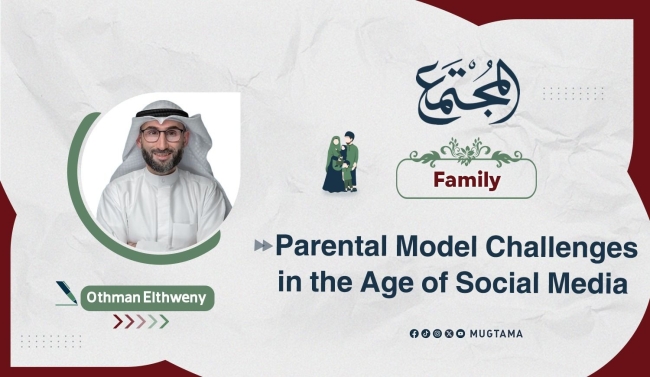Parental Model Challenges in the Age of Social Media
In our contemporary world, changes are accelerating and directions are diverging, to the extent that families face a multitude of challenges they have never encountered before. The parental role model, which has always been the primary fortress in building the children's character and instilling noble values, is now threatened by the digital globalization that has allowed our children to be exposed to multiple worlds and diverse cultures. With all this openness, social media has begun to exert its influence on the hearts and minds of the children, shaping part of their identity, thus surpassing the traditional role of the family. But, has the parental role model lost its influence entirely? Can parents regain their educational role amidst this surge?
The parental role model is not merely about giving advice or imposing instructions; it is about actions practiced and situations embodied in front of the children day by day. A child observes with their eyes and contemplates through their experience what they see from their parents. They learn honesty when they see their actions matching their words, they acquire respect through their refined interactions with others, and they internalize integrity by noticing their diligence in fulfilling their duties with sincerity.
These values instilled at home form the foundation for the children's character development, reflecting their psychological stability and social behavior. Undoubtedly, children who grow up under the umbrella of these values embodied in the parental role model are more capable of facing life’s challenges and more confident in making their decisions. As the Prophet Muhammad (peace be upon him) said, “Everyone is born a Muslim, but his parents make him a Jew, a Christian, or a Magian,” emphasizing that parents are the cornerstone in shaping the children's conscience and guiding them towards authentic values.
However, this role is no longer as easy as it was in the past. The last few years have witnessed fundamental changes that have affected the nature of the relationship between parents and their children. Perhaps the most prominent challenge is the digital invasion imposed by social media. These digital platforms, with their ability to present alternative and sometimes distorted role models, have begun to pull the rug from under the parents’ feet. The biggest issue is that these digital role models do not adhere to family values or represent its cultural heritage. Added to this is the pressure of daily life and excessive preoccupation with work, which has made many parents absent from their children's lives, both physically and emotionally.
This absence has not only created a gap but also led to a deep conflict between what children experience within their families and what they see on their phone screens. While social media presents an idealized picture of family life, this picture may seem far from the reality the child lives at home, creating feelings of frustration and dissatisfaction. This conflict drives some to rebel against family values or seek other alternatives that give them a sense of belonging. Ironically, these alternatives may be negative role models that contradict what parents try to instill in their children, leading to behavioral and identity disorders.
The values transmitted from parents to children are the foundation on which society's stability is built. Honesty, integrity, responsibility, and respect are not just slogans to be taught but principles to be embodied in every daily action. When parents demonstrate a commitment to these values in front of their children, they reinforce concepts of uprightness and integrity. Among the most important skills passed on through the parental role model are effective communication, time management, and responsibility. Children who see their parents balancing work and family life and handling problems wisely are more likely to emulate these behaviors in their own lives.
But what happens when the parental role model is absent or diminished? The impact here is not limited to the children alone but extends to undermine the very roots of the family and society as a whole. Children who lack a role model at home are more susceptible to external influences, whether from their peers or the media. This state of value vacuum leads to behavioral deviations or a lack of self-confidence, which negatively affects family stability and, consequently, societal stability. Today, we observe the manifestations of this void in some communities, from increasing family disputes to rising crime rates and weakening moral values.
Nevertheless, reclaiming the role of the parental role model is not impossible. The starting point lies in parents' awareness of their pivotal role in their children’s lives. This awareness requires continuous effort to learn effective parenting methods and to deal with the challenges posed by the digital age. Additionally, dedicating daily time for dialogue with children, listening to their problems and interests away from electronic devices, is essential for rebuilding bridges of trust.
However, dialogue alone is not enough. Parents' actions must serve as the model to be imitated. When parents adhere to the values they wish to instill, such as honesty and integrity, they reinforce these values in their children's conscience.
The parental role model is not a luxury but a necessity that cannot be dispensed with in building a balanced generation capable of facing the challenges of the times. The Prophet Muhammad (peace be upon him) said, “Each of you is a shepherd and each of you is responsible for his flock.” This responsibility obliges us to reassess our roles as parents and to elevate our parenting practices to meet the demands of the modern age.
-------------------------------------------------------------


